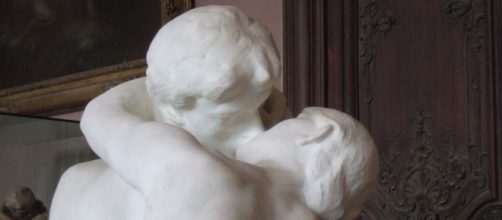You could have made book on this story.
There were signs along the way that foretold West Virginia Republican’s recent decision to threaten art museums with prosecution if they showed “obscene” art.
You saw this same concern brewing last year when a Florida school board fired a principal for allowing students to see Michelangelo’s statue of David.
Certainly, fretting over propriety isn’t new. It showed up back in 1997 when Brigham Young University removed from a sculpture show Rodin’s “The Kiss.”
This sculpture of a nude couple in an embrace was censored in the belief that it would offend some viewers.
That same reasoning drove the West Virginia legislature to threaten museums with five-year jail terms and up to $25,000 fines.
What defines 'obscene' art?
Concerns about obscenity have also prompted the banning of books at libraries, suppressing all that can be considered objectionable. The hitch is that it’s not clear what that is.
Instead of defining “obscene,” West Virginia’s legislature bill only specifies the ways of enforcement.
The state’s existing definition takes in anything that “an average person” would call sexually explicit presented “in a patently offensive way.”
Does that sound like Michelangelo’s “David” to you? One may wonder if libraries carrying art history books illustrated with images like “David” could be prosecuted.
West Virginia State Del. Brandon Steele, who introduced the bill, has called libraries “the sanctuary for pedophiles.”
But W. Virginia House Minority Leader Sean Hornbuckle is worried. “This is a very dangerous bill” owing to the vagueness of the wording.
Museums speak up
The West Virginia Association of Museums issued a statement also faulting the “vague language,” contending that it “endangers the community of library and museum professionals.”
Artnet reports that the West Virginia bill would be a first in the U.S. to targeting museums for obscenity.
Hardly 'a first'
Remember the Showtime movie “Dirty Pictures” in 2000? The movie took you back to 1990 when art went on trial in America. That’s when a director of a Cincinnati art museum, Dennis Barrie, was charged with obscenity.
Barrie faced a jail sentence for showing Robert Mapplethorpe's homo-erotic photographs.
But after only two hours of deliberation, eight jurors in a town that banned X-rated videos, topless bars and the sale of Playboy magazine, decided that Mapplethorpe brought a sense of perfection to his subject that made it “art.” And they found Barrie not guilty.
If citizens in such a restrictive town could judge Barrie not guilty of displaying supposed obscenity, what can West Virgnia be worried about?
If the worry is about offending some people, West Virginia Republicans didn’t see public reaction to the “not guilty” verdict in Barrie’s case at a Cincinnati Reds ballgame.
When the verdict was reached, the news was announced by a local radio station broadcasting the game, and the fans stood up and cheered.
Can it be that politicians don’t look past the last election, and ignore any history that came before?


